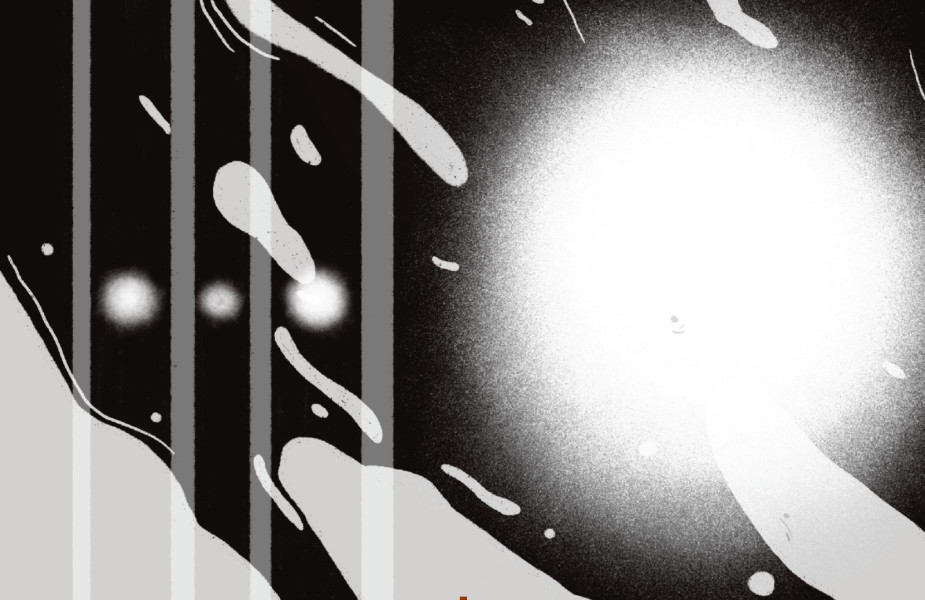Ontology of God
Big Mike says I read that dogs
don’t have a sense of time a minute
is like an hour an hour like a day
a day like a minute. The continuity
is skewed & time is placed without
thought into various boxes. I think
what it must be like to be
a dog because yes I be
with my dogs in this massive cage
trying to exhaust every thread
of thought surrounding time. Maybe
that’s why we say things like Oh, [name]?
Yeah that’s my dog & use dog
as a placeholder for when we secret
the names of those involved
in the robbery stabbing extortion.
We want to shake off the slough
of our numbered bodies hieroglyphs
in our skin sluiced onto the floor.
We want to live in a space
free of calendars & clocks & the minutes
we must share but the high
fruits are not ready to fall from this
life. Not yet. Ciph & Civ claim God
body & who am I to tell them otherwise
when we all want to claim
master key to lock silo
to grain & again own the con-
tents of our own dufflebags & spoken
languages without restraint. Still
when I call Doc he says What’s good
God? & tells me about my god-
daughter her mews & her small body
taking hold of the world around
her. When I buried my faith
I didn’t dig deep no I didn’t
& from the dirt sprung forth a woman
I asked her I said What is your name?
& she just smiled past me which left
me confused. When I woke up
I went to commune with the poodle
down the hall who quietly trotted
around while her master
played cards.
Bodies of Water
There are no empty vessels when everything has proper weight.
— James Wood
Sitting in the substance abuse class we talk
about moderation the therapist
Elissa loosening the clenched jaws each man
has labored for years to claim as his own
opening the floor to the stories we
claim. The watch-words are criminal thinking
& this is commonplace. This is everyday
in the joint correction. That’s what this is
correction correction in the depart-
ment of closely governed boxes. Bodies
of water are different no longer
signified in themselves but these bursting
symbols overflowing with money &
drugs & the women we see in photo-
copied porn. They become our desires
transposed amongst the pasts we had assumed
to be ours stories we lived in real-time
yet are read fast by this institution
as empty glasses vessels to be filled
& tossed long into whatever ocean
borders the nation with the most bullets
& the most mechanisms to keep us
from loading those bullets. We are thirsty
for any other ocean for bodies
of water not weighted with the remnants
of these floating cages of correction
of anything unseen but still policed.
Intro
I don’t know how I ended
up here yeah actually I
know. I called it I made myself
a dumb prophet & cuffed my own
wrists like a God who creates
& creates & creates too
many worlds to wave his hand or
whatever he believes he’s doing
over & grant the prayers
of his reckless children. He gets
mad because he gets shown up. He
fails at the feet of his
creations. I know how
I got here. When I first came
down they tested my criminal-
ity by sitting me down
in a small room an office
giving me a battery
of statements like If my fam-
ily gets hurt I feel the urge
to retaliate & some
people deserve to be pun-
ished (that one I laughed at). I was
to answer with agreement or
strong denial. I must have
passed my report read Low Prob-
ability of Reoffense
but a sentence is a sentence
& now it’s almost a decade
with more to go & all my files
in a drawer full of other
men’s histories so many
histories. Do you know
the stories Do you know who
I am Do you understand
what I am Can I tell you
I’ll try to sing this broken
song & summon my tribe ones
who will one day carry me
home & damn damn I know
it’s a moonshot but maybe
you’ll come find me before I lose
myself in this jungle.
